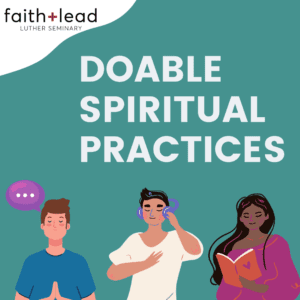
What can I do every day in a mindful way that opens me up to God?
For the first half of my career as a pastor I deeply dreaded anytime we clergy types would gather together and someone would say, “I’d like to invite you into a time of silence,” or worse, “Let’s all take a deep breath together.” I am a raging extrovert and often function like a cross between Dory (from Finding Nemo) and a shark. I know how to keep moving, and I don’t like to stop. Keep swimming!
Centering prayer
The only place that mindset got me was wound up and burnt out. When I attended a community organizing training on a cold week in January I knew something needed to change. So when a trusted friend said, “I would like to invite all of you into a time of Centering Prayer,” I didn’t say no.
Years later I have learned that my propensity for keeping myself busy means that I don’t spend enough time on self reflection, and that is a recipe for disaster. I have adopted a daily practice of Centering Prayer. In the simplest explanation, Centering Prayer is a time to deeply listen for God and get out of the way. Silence is a medium for opening ourselves to the God who is all around us at all times and is in all of God’s amazing creation. All we need to do is clear our minds and listen. When I am open to God, I am more open to myself too. Some days that can be terrifying, but I have learned a lot about myself in these last few years.
Performing gender
One of those learnings is that when I am really honest with myself and with God, the gender binary doesn’t serve me very well. I am someone who was identified female at birth, and I have tried my hardest to perform that gender my whole life. There are expectations and assumptions that as a younger person would drive me to tears when I didn’t understand or when I would fall short. I never wanted to be a boy, but I sure didn’t manage the girl thing very well either. Often this meant that I didn’t fit in places other people thought I should. At the same time the people around me put me in the female category and treated me like they did other women. Sometimes that involved sexism and harassment. Sometimes that involved bridal showers and trips to the spa that seemed like everyone else knew what to do and how to feel, and I just felt out of place.
After spending a few days in New York representing my church body at the United Nations Commission on the Status of Women and being around people from all over the world working for gender equality and the empowerment of women throughout the world, I started to consider that maybe this advocacy work was for my sake as well. It wasn’t only about the status of those women over there, but it was also good for me, and I didn’t need to live up to anyone else’s expectations.
When I told my husband that I wasn’t in love with my gender assigned at birth and the gender I had been trying to perform for years, he was intensely kind. When I said that I resonated most deeply with the idea of being genderqueer he said, “I think you are just finally finding words for the ways I’ve always experienced you.”
About six months later our eleven-year-old child said to me in the kitchen, “Mom, I don’t think you know what this is, but I am pretty sure that I am gender non-binary.” I hugged them tight and told them that I might understand a bit more than they were giving me credit for, and that I was so excited for them figuring this out now. Our kid picked a new name (which had been on our list of names for them when they were born), and they asked us to use they/them pronouns with them.
Loved enough to really live
My experience has been that when people with privilege are asked to change the language they use, the first excuse they give for not making the change is that “it’s hard”. Often the complaint that something is too hard negates the suffering the person has experienced who is asking for the change. A national survey from The Trevor Project released in May of 2021 “found that transgender and nonbinary youth who reported having their pronouns respected by all the people they lived with attempted suicide at half the rate of those who did not.” By respecting pronouns I could honor my child and the way God made them and help them love themselves enough to really want to live. We can do hard things, especially when it is so life-giving to another person. We can do hard things, especially when it honors the spark of God in one another most fully.
How is using everyone’s pronouns a spiritual practice? Spiritual practices are regular parts of our lives that help us stay in close contact with God or that open us to God. Finding out people’s pronouns fits because it helps us to see God in all people, in all genders, and keeps us mindful that God is concerned with both the generalities and the specificness of who we are and how we are made.
As with all good spiritual practices, this one starts with individual work.
Your turn
- Ask Yourself:
What are your pronouns? Do you use them as part of your name on Zoom? Are they in your e-mail signature? Do you have a sweet enamel pin for your lanyard (our kid totally has maybe a million of these.) Are you ready to answer the question when someone asks for your pronouns?
I rarely am. The pronouns I like the best are what are called neopronouns. I particularly appreciate the per/per/pers pronouns as they come from the word person. Most neopronouns try to move us out of the gender binary. I get to choose who and how I share my pronouns. Some days I just don’t trust that the educating I am going to need to do is worth the heartache and dismissiveness I have encountered. Some days it’s just easier to answer with she/her/hers because it’s what others have come to expect. Other days, I tell people that I don’t love pronouns because I’m still wondering what mine are, and I trust folks to use any neopronouns they know.
This is the other fun thing about pronouns: they aren’t set in stone. Gender is fluid and we can change and learn more and be as open or as closed with our lives as we feel safe. You may find someone’s pronouns change the more you get to know them. Some people are open to lots of pronouns. You may find they/them/theirs works better for you in some situations. So keep checking in with yourself.
- Regularly Ask Others for Their Pronouns
Then it’s time for you to check in with the people who surround you. Take an active interest in what their pronouns are and use them. The mindfulness this takes in daily life is a spiritual practice. Find yourself asking people what pronouns you should use with them and honor them. This practice will remind you of the beautiful and holistic way God has made all of us in all genders and gender expressions. Asking and being aware takes you out of the realm of assumptions and places you squarely in being present and open to the ways God shines through each of us.
- Apologize and Do Better Next Time.
Know there are going to be moments when we stumble or when we forget, but like all spiritual practices, it’s a practice. Apologize and do better next time. Don’t make it all about you. Own that you are learning and get back on that gorgeous gender unicorn. We are always changing, the world is always changing, and God is always on this journey with us—we never have to arrive. We only have to be.



